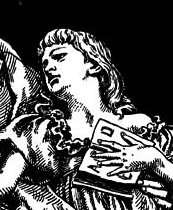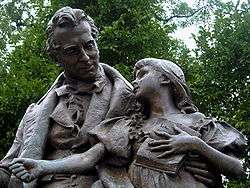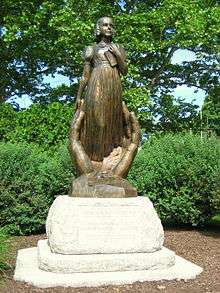Alice Cogswell
Alice Cogswell (August 31, 1805 – December 30, 1830) was the inspiration to Thomas Hopkins Gallaudet for the creation of the American School for the Deaf in Hartford, Connecticut.
Alice Cogswell | |
|---|---|
 Engraving of Alice Cogswell (1889) | |
| Born | August 31, 1805 |
| Died | December 30, 1830 (aged 25) Hartford, Connecticut, United States |
At the age of two, Alice became ill with "spotted fever" (cerebral-spinal meningitis). This illness took her hearing and later she lost her speech as well. At the time, deafness was viewed as equivalent to a mental illness, and it was widely believed that the deaf could not be taught. Thomas Hopkins Gallaudet moved into the house next door to hers when she was nine years old. He soon noticed that she wasn't interacting with the other children, and when he asked why, he was informed that she was deaf. Intrigued, he decided to teach her to communicate through pictures and writing letters in the dirt.[1] He and Alice's father, Dr. Mason Cogswell, decided that a formal school would be best for her, but no such school existed in the United States. Gallaudet went to Europe for 15 months, bringing Laurent Clerc back with him upon his return. During the time of his absence, Alice attended a hearing school and somewhat furthered her education, though the situation was not ideal. She was very lively, and enjoyed reading, sewing, and dancing. She was reportedly very good at mimicking others, and was fascinated by the concept of music.[2]
Alice Cogswell and six other deaf students (Alice Cogswell, George Loring, Wilson Whiton, Abigail Dillingham, Otis Waters, John Brewster, and Nancy Orr.) entered the school that would become the American School for the Deaf in April 1817.
Cogswell died at the age of twenty-five on December 30, 1830, twenty days after the death of her father.
Legacy

On the campus of the American School for the Deaf at Hartford stands a statue of Gallaudet and Cogswell. Another statue of Gallaudet and Cogswell, by Daniel Chester French, stands in front of Gallaudet University, depicting Gallaudet sitting on a chair and Alice standing next to him to share their communication of "A" in fingerspelling.[3] The Alice Cogswell statue (American School for the Deaf Founders Memorial), by Frances Laughlin Wadsworth, also represents her as a young girl.
The Gallaudet University Alumni Association gives the Laurent Clerc Cultural Fund Alice Cogswell Award to people for valuable service on behalf of deaf citizens.[4][5]
Alice Cogswell is known as a remarkable figure in the history of deaf culture, illustrating a breakthrough in deaf education. She showed that the deaf are capable of being taught and of high intelligence. Alice stands as an example of I. King Jordan's famous quote, "Deaf people can do anything hearing people can do, except hear."

External links
References
| Wikimedia Commons has media related to Alice Cogswell. |
- Jay, Michelle. "Alice Cogswell: An Inspiration". If My Hands Could Speak. Start ASL. Retrieved 22 May 2013.
- "Alice Cogswell". Deaf Is. American School for the Deaf. Archived from the original on 11 February 2008. Retrieved 22 May 2013.
- Gannon, Jack. 1981. Deaf Heritage–A Narrative History of Deaf America, Silver Spring, MD: National Association of the Deaf, p. 66 (PDF Archived 2012-04-24 at the Wayback Machine)
- http://www.gallaudet.edu/Documents/Alumni/1990-Hagemeyer.pdf%5B%5D
- "Alice Cogswell Award - Gallaudet University". Gallaudet.edu. Archived from the original on 2015-11-10. Retrieved 2015-10-24.